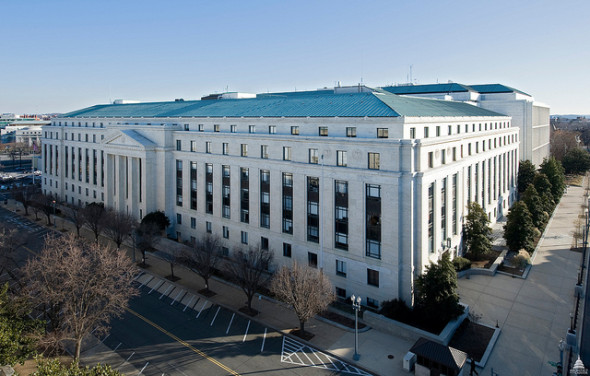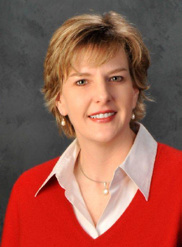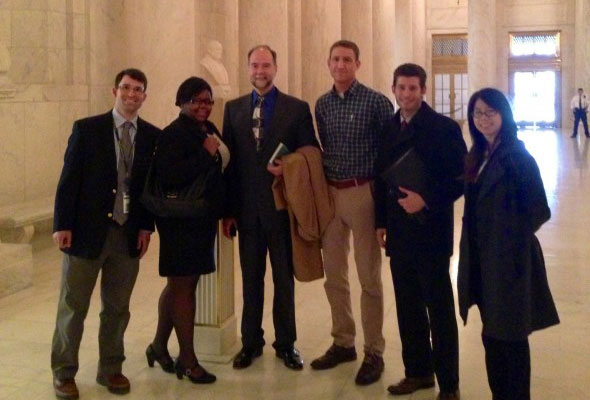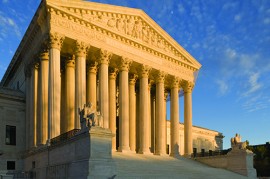Jo Lea Wigley is a 2013 graduate of the Brookings Legis Congressional Fellowship. The following article depicts her experience in the Legis Fellow program and the value it has added to her home agency, the National Geospatial-Intelligence Agency.
Use of the following article for publication on the Olin Blog is granted by author Kristen Mackey, Public Affairs Officer of the NGA Office of Corporate Communications.
An analytic adviser with the National Geospatial-Intelligence Agency’s Office of Corporate Communications Congressional and Intergovernmental Affairs Division recently returned from a one-year fellowship on Capitol Hill.
Jo Lea Wigley, who now works as a conduit between OCCC and the Analysis directorate, worked for Maine Sen. Susan Collins and said her time on the Hill broadened her experience and will help in her NGA career.
Although part of the reason she chose Collins’s office was the senator’s appointment to the Senate Select Committee on Intelligence and its relevance to Wigley’s own career in the intelligence community, Collins’ solid reputation and known leadership on the Hill was the most appealing reason for choosing the senator, said Wigley.
“I had followed Collins’s career and viewed her as a hardworking, pragmatic, reputable public servant,” said Wigley. “She works issues that are vital to the well-being of the nation, not just her home state of Maine. She is well respected by other senators on both sides of the aisle, which I believe is largely due to her grasp of substantive policy issues, her attention to detail and her ability to work out compromises.”
Years of interest in the legislative process prompted Wigley to answer NGA’s competitive-education call for a congressional fellowship offered in conjunction with the Brookings Institution, a Washington, D.C.-based think tank, she said.
The agency selected Wigley as its candidate for the program in February 2012, she said. She received word from Brookings in late 2012 that she was accepted and would start the program in January 2013. She chose to do the 12-month fellowship to maximize her experience on the Hill. Brookings also offers a seven-month fellowship.
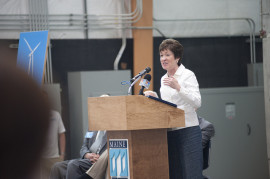
Senator Susan Collins
During her time with Collins, Wigley focused on foreign affairs, defense and national security, she said. Her job included researching topics, drafting legislation, coordinating with other congressional offices, weighing in on vote decisions, and meeting with think tanks, lobbyists and academia – many of which vie for congressional aid and support. She spent most of her time doing hearing preparation.
“The most important part of hearing preparation was crafting questions for the senator to ask the witnesses,” said Wigley. “We had to know specific topics the senator was interested in, research positions of other senators on the topic, collect public statements of the witnesses, then craft questions for her that were pointed and well sourced.”
People don’t understand how hard Congress works, said Wigley.
“Most of us have an impression of Congress from Hollywood, TV shows and the news media – with crooked staff, fine dining and ‘bad’ lobbyists,” said Wigley. “In reality, the staff and members work tirelessly for issues they believe in, and the lobbyists are legitimately seeking support for important issues.”
One of Wigley’s proudest accomplishments during her fellowship was drafting a piece of the Iran sanctions legislation, she said. She worked for months with another fellow and a variety of experts from the Congressional Research Service, industry and experts on foreign affairs to negotiate the first draft of the sanctions language.
There were policy differences between the fellows and their respective offices, said Wigley. But, they were able to reach mutual agreement and coordinate with other committees, special interest groups and the State Department to address all concerns before presenting the final language of the bill to the senators.
“Being a fellow gave me an unprecedented understanding of Congress and how it works,” said Wigley. “I know that my experience there makes me a better NGA employee in that the fellowship helped me understand how members think about issues. That’s invaluable.”
The Legislative Fellows Program consists of an intensive orientation to the operations and organization of the U.S. Congress, followed by a full-time assignment on the staff of a congressional member, committee or support agency.
Learn more about the Brookings Legislative Congressional Fellows Program
Article originally published in theNGA Pathfinder, Magazine of the National Geospatial-Intelligence Agency, page 18 of Vol. 12, No. 2 Spring 2014.
Main image of Dirksen Senate Office Building. Image taken from the public domain Architect of the Capitol website.


